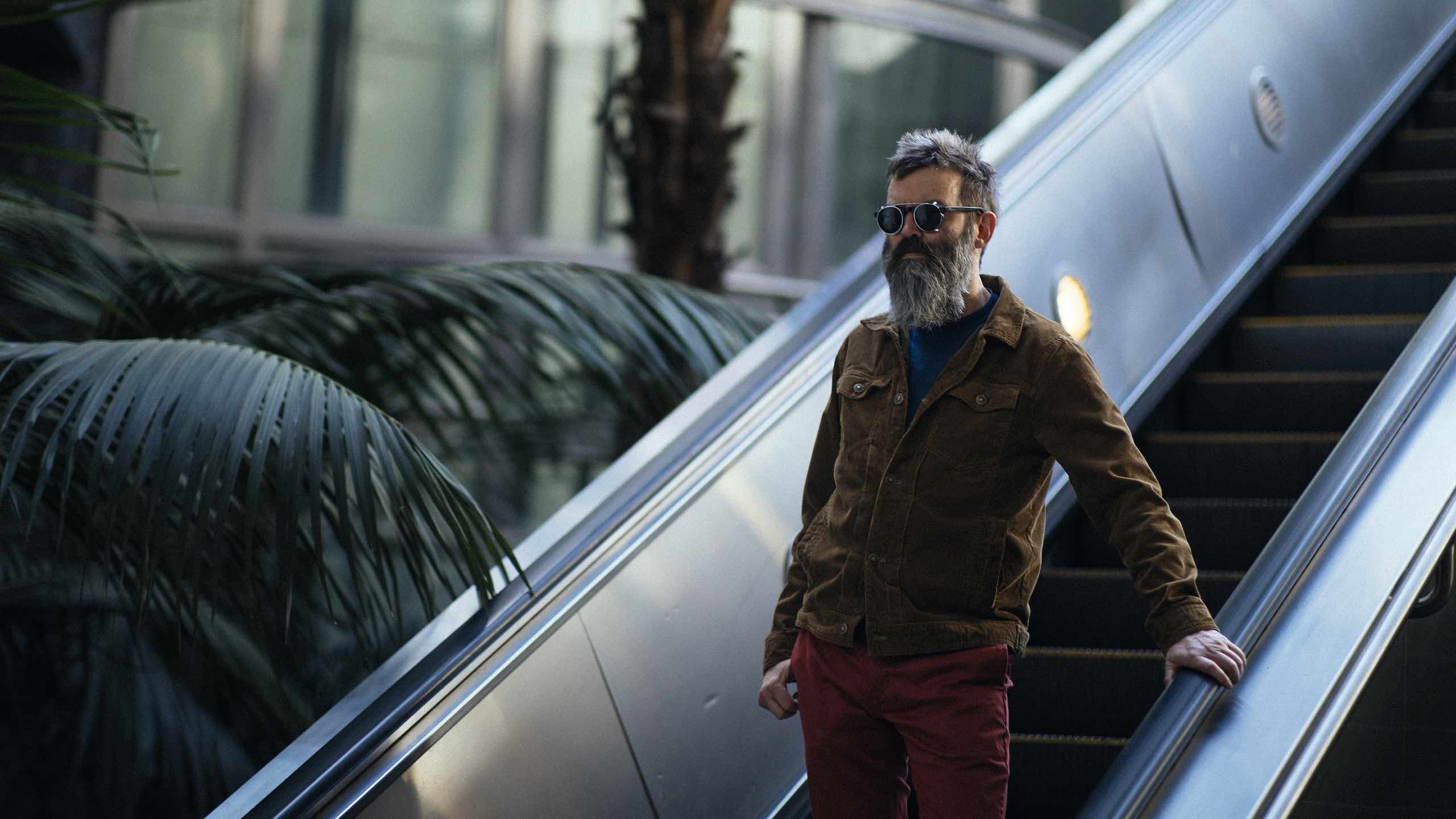On the cover of Eels Time, the 15th and latest release from the Los Angeles–based project Eels, singer Mark Oliver Everett is black-lit, captured doing a Pete Townshend–like kick sans guitar. “Yup, barefoot, wearing a tux, at my age,” Everett quips. “It’s amazing!” It’s no coincidence that Everett, who adopted the pseudonym E back in the early ’90s when he started his solo career prior to the formation of Eels, chose to emulate Townshend. The Who founder and guitarist is not only one of his musical heroes, but also his personal friend.
Townshend wrote a back cover blurb for Everett’s 2008 memoir Things the Grandchildren Should Know, calling it “one of the best books ever written by a contemporary artist.” In the book’s foreword, titled “Rock Music! Death! Crazy People! Love!,” Townshend added, “I learned more about my own business and my own methods by reading this book than I did by reading the life of Chuck Berry, Elvis, or David Bowie.” When I speak to Everett about Eels Time, he reveals he’d just sent Townshend a message. “It was his birthday, and I said, ‘I'm so glad that you continue to have birthdays and that line in ‘My Generation’ turned out to be bullshit,” E says.
The lyric in question—“I hope I die before I get old”—is a statement that neither of The Who’s surviving members, Townshend and vocalist Roger Daltrey (nor Everett), stand behind. When “My Generation” was released as a single in 1965, Townshend was a mere 20 years old while Daltrey was 21 and they were filled with youthful piss and vinegar. Fast-forward nearly six decades later, Townshend is now 79, while Daltrey celebrated his 80th birthday in March.
At 61, some may consider Everett old, too, but he doesn’t want to check out yet. He had his own brush with death last December due to a heart valve aneurysm that required open heart surgery to repair. “It’d been a few years since my doctor started keeping an eye on it,” he reveals. “And then it got to the point where it got big enough to where the cardiologist said that ‘open heart surgery is in your future.’ He said it’s the kind of surgery where we stop your heart on the table. So that gave me something to think about for another year until it finally got to the point where they were like, ‘We gotta do this now!’” His father, noted physicist Hugh Everett III, died of a heart attack at the age of 51. E was 19 at the time, and discovered his father’s lifeless body. As he grew into adulthood, Everett has focused on the health of his own heart under the care of his doctors, helping him avoid the premature death that befell his father.
“Nothing feels better than Pete Townsend saying your song is good.”

Back to Townshend: Everett says the Who guitarist took his message goodheartedly. “He laughed and told me how much he likes the song ‘Time,’” he recalls. “Nothing feels better than Pete Townsend saying your song is good.” In the track that opens Eels Time!, Everett shares that he’s feeling his life ticking away. He recorded the album—which features contributions from Tyson Ritter of The All-American Rejects as well as past collaborators Koool G Murder, The Chet, and Sean Coleman—before he had his surgery. Yet with it hanging over his head, it seeped into the album’s lyrical themes. “I think in general—even without knowing you've got open heart surgery coming up—as we all get older the concept of time gets more and more to the forefront of your mind every day because you become acutely aware that there’s less of it available to you in the future,” he says.
In the song “Time,” Everett pleads, “Maybe there’s just some way, dear God, I can stay,” but not before fondly looking back at the days of his youth when “there was nothing but time.” Back then, Everett saw The Who’s classic original lineup with the late Keith Moon on drums and now-deceased John Entwistle on bass at the Capital Centre in Landover, Maryland, the closest tour stop to his childhood home in Virginia. “My sister, who was six years older than me, took me to a Who concert,” he says. “It was the last tour with Keith Moon [who died in 1978], and then when they came back with [Moon’s replacement, former Small Faces/Faces drummer] Kenney Jones I had a front-row seat.” Everett has at least one distinct memory of the latter gig. “There was a part where Pete went to do one of his kicks and he fell on his ass, and I instinctively shot out of my front-row seat to try to catch him with my arms out,” he recalls. “I was, like, 16.”
It’s a good memory for Everett, whose life has been marked by a trio of family tragedies, as chronicled in Things the Grandchildren Should Know. Along with the premature death of his father, his sister, Elizabeth—who took him to the Who concert—died by suicide in 1996 after suffering for years with mental illness. Two years later, his mother was diagnosed with terminal lung cancer and died not long after. Everett also documented these tragedies and how he coped with them on his second album, 1998’s Electro-Shock Blues.
Somehow, Everett persevered through it all, and in 2006, he met Townshend at the Leeds Festival, the site where The Who’s famed 1970 album Live at Leeds was recorded. Townshend was there with his now-wife, musician Rachel Fuller, in an Airstream trailer webcasting their “In the Attic” series, and Everett was invited to play on the show. That led to more performances with Townshend, including at T in the Park in Scotland and a 2008 date this writer witnessed at the Troubadour in West Hollywood, where Everett was joined by Death Cab for Cutie’s Ben Gibbard and Townshend on the latter’s 1980 solo hit “Let My Love Open the Door.”
Though Everett has performed with Townshend several times over the years, he still marvels at the fact that he’s become friends with one of his childhood idols. “It’s weird as shit!,” he exclaims. And while the clock may be ticking, it’s clear neither Everett, nor his friend Pete, are hoping to die any time soon. FL







